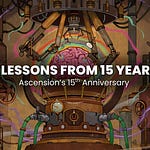James Ernest is a man of many talents. He’s a screenwriter, poker player, juggler and game designer. He’s worked with Wizards of the Coast, Paizo Publishing, and even developed the game _Tak_ with legendary fantasy author Patrick Rothfuss. In this podcast, James talks about how he and his company, Cheapass Games, work to designs new games, develop rulesets, and manage the expectations of players. This episode is a treasure trove of game design knowledge. Check it out!
Show Notes
James Ernest on Game Design Philosophy (12:45.33 - 15:28.56):
"In game design, simplicity is key. You want to create an experience that's easy to understand and get into, but also offers depth and strategy for those who want to dive deeper. It's a delicate balance, but it's what makes games enjoyable for a wide range of players."
James Ernest shares his insights into game design philosophy, emphasizing the importance of simplicity. He believes that great games should be accessible to newcomers while providing layers of depth for experienced players, creating a satisfying experience for all.
Challenges of Bias Randomness (17:39.20 - 19:58.14):
"Biased randomness can be frustrating for players. It's important to design games that minimize the impact of luck and give players meaningful choices. When randomness feels unfair, it can lead to frustration and a lack of enjoyment."
Ernest discusses the challenges of biased randomness in games, highlighting the frustration it can create. He advocates for designing games that offer meaningful choices to players, even in the face of randomness, to ensure a more enjoyable and fair experience.
The Creative Process Across Mediums (23:14.89 - 25:50.75):
"Whether it's designing games, writing, or filmmaking, the creative process shares common elements. It's about focusing on the end result and crafting an experience for the audience. Learning the tools of the trade is essential, but it's the final experience that truly matters."
James Ernest reflects on his diverse creative endeavors, from game design to writing and filmmaking. He emphasizes the commonality of the creative process, where the focus is on delivering a memorable experience to the audience, regardless of the medium.
Learning Through Doing (28:07.42 - 30:15.18):
"The best way to learn game design is by making games. You can read books, study theory, and play games, but nothing beats the hands-on experience of creating your own games. Embrace the process, make mistakes, and iterate."
Ernest shares his advice for aspiring game designers, stressing the importance of learning through practical experience. He encourages newcomers to dive into game design, make mistakes, and continuously iterate on their creations, as it's the most effective path to mastery.
Favorite Games and Influences (32:40.10 - 34:18.92):
"Magic: The Gathering has been a significant influence on my game design journey. It taught me about deck-building, balance, and the importance of player choices. As for poker, it's a game that's both simple and incredibly complex, and I find its depth fascinating."
James Ernest discusses his favorite games and influences. Magic: The Gathering played a pivotal role in his understanding of deck-building and player choices, while poker captivates him with its simplicity and complexity, making it an evergreen source of inspiration.
The Essence of Game Design (36:29.15 - 38:12.78):
"Game design is about crafting an experience. It's not just about creating rules and mechanics; it's about how those elements come together to provide enjoyment, challenge, and immersion for players. The final product should resonate with the audience."
Ernest encapsulates the essence of game design, highlighting that it goes beyond rules and mechanics. It's about curating an experience that resonates with players, offering enjoyment and immersion, ultimately defining the success of a game.
Connectivity Through Gaming (40:22.50 - 41:08.17):
"As long as people sit down together to play games, it brings them closer. Games have the power to build connections and foster positive interactions. They're a universal language that transcends boundaries."
In closing, James Ernest reflects on the unifying power of games. He believes that games, when played together, strengthen bonds and create positive connections among people. Games, in his view, are a universal language that bridges gaps and enriches lives.












